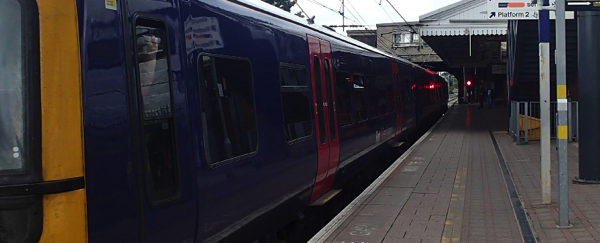Monday Accident & Lessons Learned: Passenger Trapped & Dragged by Train


From the Rail Accident Investigation Branch …
At around 13:10 hrs on 25 July 2015, a passenger was dragged along the platform at Hayes & Harlington station, London, when the 11:37 hrs First Great Western service from Oxford to London Paddington departed while her hand was trapped in a door. The passenger, who had arrived on the platform as the doors were about to close, had placed her hand between the closing door leaves.
The train driver did not identify that the passenger was trapped and the train moved off, dragging the passenger along the platform. After being dragged for about 19 metres, the passenger lost her footing and fell onto the platform. The passenger suffered head, hand and back injuries.
RAIB’s investigation found that the passenger had deliberately placed her hand in the closing door in the expectation that it would re-open as a consequence. RAIB has concluded that after closing the doors of the train, the driver either did not make a final check that it was safe to depart, or that the check was insufficiently detailed to allow him to identify the trapped passenger. The driver may have been misled into thinking that it was safe to depart because a door interlock light in his cab had illuminated, indicating that the doors were closed and locked and he was able to take power.
Our investigation identified that the train driver and other railway staff held the same misunderstanding: if someone had a hand trapped in a door it would not be possible for the door interlock light to illuminate and a driver to take power. This is not the case, and the door was found to be compliant with all applicable standards after the accident.
As a consequence of this investigation, RAIB has made two recommendations.
The first, addressed to RSSB to review, and if necessary extend, its research into the passenger/train interface to understand passenger behaviour and identify means for deterring members of the public from obstructing train doors.
The second recommendation is addressed to operators and owners of trains similar to the one involved in the accident at Hayes & Harlington, is intended to continue and expand upon a current review into the practicability of fitting sensitive door edge technology to this type of train.
RAIB has also identified three learning points. The first concerns improving awareness among train drivers of the limitations of train door interlocking technology and the importance of the final safety check when dispatching a train.
The second concerns the potential for drivers to be distracted by the use of mobile communication devices while driving.
The third is aimed at train operators to have the necessary processes in place to identify drivers who are showing signs of sub-standard performance or not engaging positively with measures agreed as part of a Competence Development Plan and the provision of briefing and guidance material for driver managers to enable them to identify behaviours and attitudes which are inconsistent with those expected of train drivers.
For the complete report, see:



